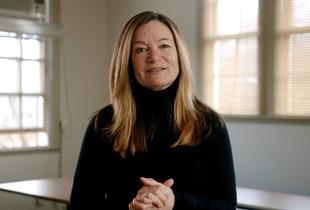It’s common for people who have experienced trauma to numb their emotional pain, bad memories, shame, or fear with substances — which can, in turn, make it harder to process their trauma and manage their symptoms.
Trauma-informed practice, which BC Mental Health and Substance Use Services has adopted in all of its programs in recent years, seeks to help put an end to this cycle by addressing past trauma in treatment approaches. Now, with the purpose-built Red Fish Healing Centre for Mental Health and Addiction set to open in just a few months, care providers will be better equipped than ever to provide trauma-informed care.
The Red Fish Healing Centre’s new, evidence-based care model prioritizes these principles of trauma-informed care (based on the Substance Abuse and Mental Health Administration’s model):
- Safety, security and comfort
- Trust and transparency
- Peer support
- Collaboration and mutuality
- Empowerment, voice and choice
- The importance of cultural, historical and gender issues
This trauma-informed approach meets the unique needs of each client, and works to prevent re-traumatization during care.
"We recognize that most clients have experienced some form of trauma, and we ensure their voice is reflected in care planning by asking questions and giving choices."
“We recognize that most clients have experienced some form of trauma, and we ensure their voice is reflected in care planning by asking questions and giving choices,” says Dr. Jane Sun, the director of interprofessional practice at the Red Fish Healing Centre. “This can help individuals to better engage in their treatment, through increased agency and partnership.”
One example of a trauma-informed tool that care providers will use at the Red Fish Healing Centre is a customized “comfort plan” for each client that complements their more formal care plan.
 "Clients fill out a worksheet that helps them recognize and respond to low, medium, and highly distressing states, like green, yellow, and red lights of a stoplight," Dr. Sun explains. "The tool, created when the client is feeling well, acts as an anchor to help the client through strong negative emotions, as it can be hard to remember coping skills during periods of distress."
"Clients fill out a worksheet that helps them recognize and respond to low, medium, and highly distressing states, like green, yellow, and red lights of a stoplight," Dr. Sun explains. "The tool, created when the client is feeling well, acts as an anchor to help the client through strong negative emotions, as it can be hard to remember coping skills during periods of distress."
The plans are also useful tools for staff and physicians.
“These plans enable them to provide care in a way that is sensitive to the client’s individual needs,” says Kathryn Embacher, the senior director for complex concurrent disorders at the Red Fish Healing Centre. “For instance, highlighting treatment interventions that are difficult or triggering for them, and therefore need to be avoided or done in a different way.”
Clients’ histories of trauma also informed the design of the new, 105-bed facility, which puts client safety, security and comfort first.
“The décor, right down to the furniture we chose is very home-like, recovery-oriented, and trauma-informed,” says Lynn Pelletier, vice-president at BC Mental Health and Substance Use Services. “In the past, patients were essentially locked up in secure facilities for treatment. For this reason, mental health centres can have negative connotations. That’s why it’s important that the Red Fish Healing Centre is welcoming and doesn’t have an institutional feeling like some older, outdated sites.”
The facility has been carefully designed to feel like a home, complete with artwork, including local Indigenous artwork, and private bedrooms and ensuite bathrooms for each client.
 “Providing clients with their own space is a big part of fostering dignity, respect and autonomy,” said Pelletier. “For a client, having their own private space helps them to feel safe and comfortable. Many of our clients have lived in shared accommodation prior to coming here and may not feel safe in shared spaces. With individual rooms, they can make the space their own, and they have somewhere calming to return to after treatment or programming. Clients also don’t have to share washroom or shower facilities, and this brings a sense of privacy and respect.”
“Providing clients with their own space is a big part of fostering dignity, respect and autonomy,” said Pelletier. “For a client, having their own private space helps them to feel safe and comfortable. Many of our clients have lived in shared accommodation prior to coming here and may not feel safe in shared spaces. With individual rooms, they can make the space their own, and they have somewhere calming to return to after treatment or programming. Clients also don’t have to share washroom or shower facilities, and this brings a sense of privacy and respect.”
"Many of our clients have lived in shared accommodation prior to coming here and may not feel safe in shared spaces. Having their own private space helps them to feel comfortable."
The Red Fish Healing Centre has seven units, which is enough to group patients in a way that prioritizes their feeling of safety. Units themselves will be small, with only 15 people each, to foster a family feel and help keep clients from feeling overwhelmed. To help ensure clients don’t feel trapped, and to help keep staff and physicians safe, each treatment room has two exits rather than one. Additionally, all the units feature a number of wide-open spaces and large windows that let in natural light and look out onto beautifully landscaped grounds.
All therapeutic programming is also trauma-informed, treating the whole person — including their history, triggers and personal needs.
For many clients, family and intimate relationships are a source of trauma. Programming at the Red Fish Healing Centre will help address this.
“We want programming to address the importance of healthy relationships, for instance, fostering safety by setting boundaries,” said Dr. Sun. “By increasing a client’s communication skills, we can empower them to express what they need to feel safe and supported by loved ones. An example might be working with them to invite family to care planning meetings, and having them share what sort of support they want after discharge — perhaps weekly visits or phone calls. During traumas, people don’t have control. This approach takes the clients’ needs into account and empowers them to have choice and control over their care and relationships.”
The Kwikwetlem First Nation, on whose land the Red Fish Healing Centre is located, is collaborating with BC Mental Health and Substance Use leaders on outdoor and other program development so that clients can benefit from the healing properties of the land.
“Anytime we want to heal somebody, we’ll take them to the forest or up to the mountains,” said George Chaffee, a Kwikwetlem First Nation councillor and knowledge keeper. “Because that’s our place of power.”
 “These are our ancestral grounds, and they are very sacred,” said Chief Ed Hall of the Kwikwetlem First Nation. “Riverview has always been a place of transformation, and we welcome the opportunity to walk alongside our partners at the Red Fish Healing Centre to help make this a place of healing once again.”
“These are our ancestral grounds, and they are very sacred,” said Chief Ed Hall of the Kwikwetlem First Nation. “Riverview has always been a place of transformation, and we welcome the opportunity to walk alongside our partners at the Red Fish Healing Centre to help make this a place of healing once again.”
The Kwikwetlem First Nation has also co-designed a treatment room devoted to cultural and spiritual healing treatments such as smudging. This will help ensure that Indigenous clients can receive care that is culturally relevant, sensitive and safe.
Videoconferencing will be a regular part of treatment at the Red Fish Healing Centre, meaning that clients can have virtual consultations with specialists if they choose. For people who feel anxious in social settings, new health care settings or other unfamiliar settings due to past trauma, a virtual visit with a specialist offers a lot of relief.
“The opportunity to connect to health care in a way that’s appropriate for each client is a huge contributor to the sense of choice and dignity,” says Dr. Nick Mathew, the medical director of complex mental health and substance use services. “For a client, knowing they can speak to their care provider, specialist, or even loved ones in their home community means they have access to the care they need and are not detached from their support systems. This is an example of trauma-informed care as it minimizes the stress that may be associated with spending time away from home, or away from familiar care.”
Learn more about trauma-informed care at BC Mental Health and Substance Use Services.
